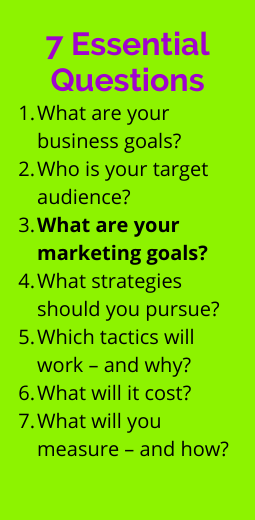|
It’s planning season for many businesses. That’s why over seven weeks we’re posing seven questions you should ask yourself and your team that will inform your marketing planning for 2020. This week we explore our third vital question: "What are your marketing goals?" Our recent posts covered business goals and audience. Now that you have a handle on these, it's time to develop this information into distinct marketing objectives.  The most effective way to approach goal setting is by using SMART methodology – setting goals that are Specific, Measurable, Achievable, Relevant and Timely. Here's a look at each of these elements:
Let's look at a few examples: Before: "To become a well-known local law firm." SMART: "To subscribe 200 new people from a 50-km radius to our legal e-newsletter in six months." Before: “To generate more revenue” SMART: “To develop 25 warm leads in 100 days through in-person and online networking.” Before: “To be everyone’s favourite pet shop.” SMART: “To get 100 new people signed up for our customer rewards loyalty programme by June 2020.” Taking it step by step  Photo by StockSnap Photo by StockSnap So, how do you put this into meaningful practice in your company? Take it step-by-step:
Now you can confidently connect the dots:
Next week: Which marketing strategies are right for you? Last week: Who is your customer – some methods to help determine who should be your target audience.
Comments are closed.
|
Author
I'm Tim Hart, owner, coach and trainer at LoveSmallBiz.com. I'm also owner of marketing communications firm Hart Communications. Archives
April 2020
Categories
All
|
Copyright Hart Communications. All rights reserved.



 RSS Feed
RSS Feed